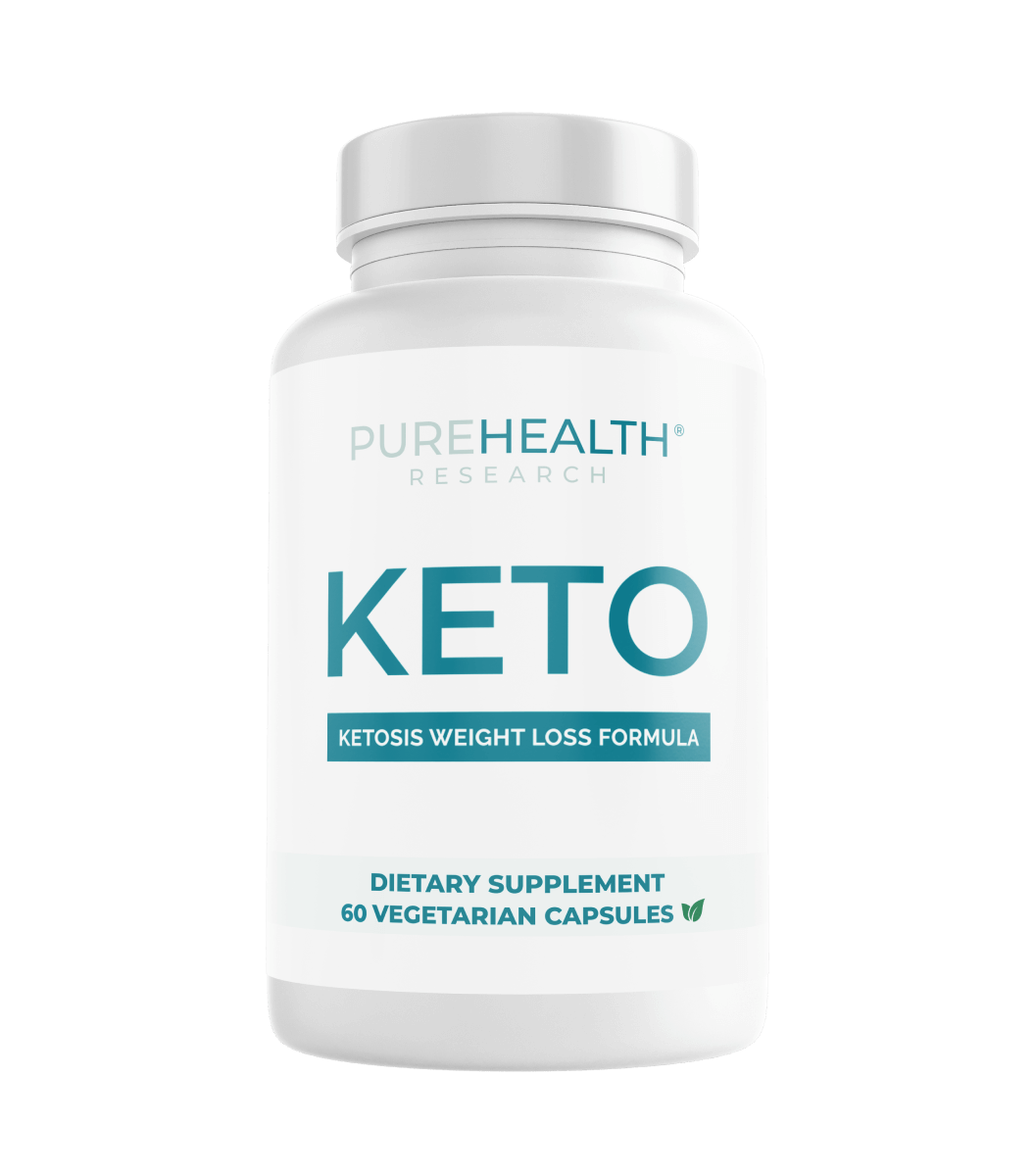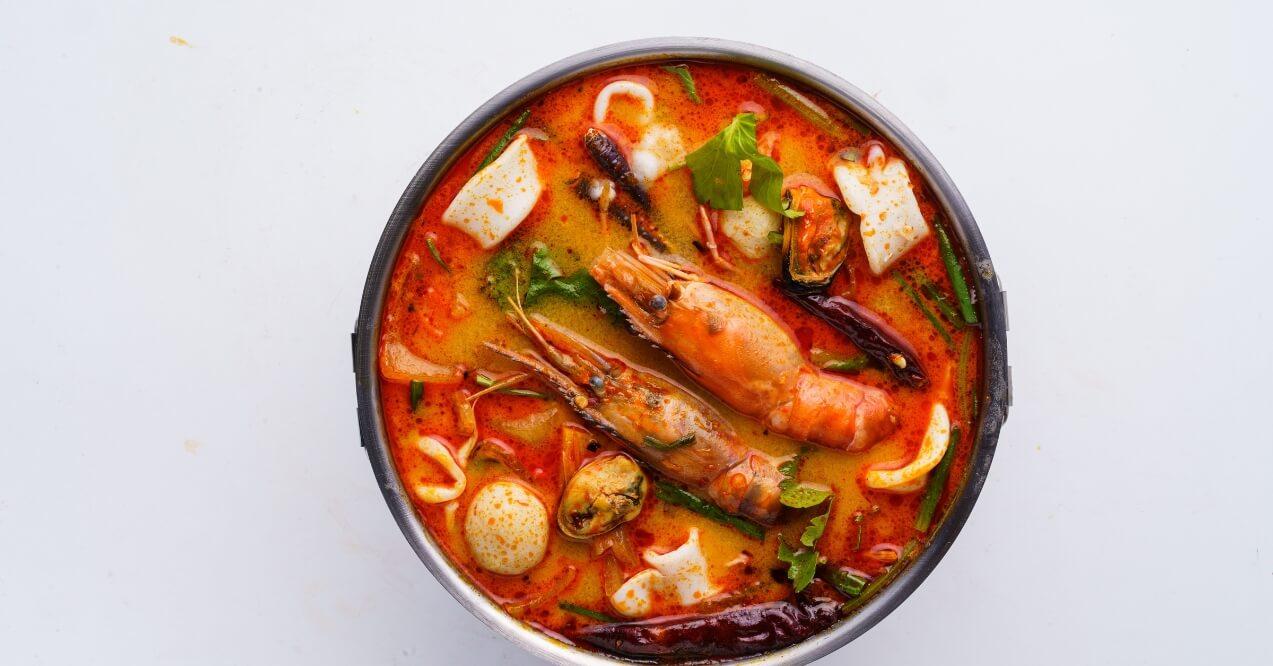7 Day Vegetarian Keto Meal Plan


Embarking on a 7 day vegetarian keto meal plan could be your gateway to a healthier lifestyle. This plan blends the benefits of intermittent fasting with the ketogenic diet, all within a vegetarian framework.
By combining these powerful dietary strategies, you may optimize metabolic functions, support mental clarity, and promote sustainable weight management. Intermittent fasting enhances ketosis, while the vegetarian focus ensures plant-based nutrition. Additionally, ensuring you include key nutrients can be beneficial for skin health—especially when considering vitamins that help crepey skin. By focusing on a balanced intake of vitamins and antioxidants, you can support both your metabolic and skin health.
For more on the synergy between these methods, check out intermittent fasting vs keto. Ready to transform your health? Let’s dive in.
Keto Vegetarian Diet Plan – What Is It?
A keto diet is a low-carb, high-fat diet that shifts the body into a state of ketosis, where fat becomes the primary fuel source instead of carbohydrates. Unlike traditional keto diets, this version eliminates meat, making it ideal for vegetarians seeking the benefits of ketosis without animal proteins. However, some flexible vegetarian keto eaters may choose to include seafood occasionally, especially when considering the best fish for keto to enhance nutrient intake.
Typically, a keto diet consists of:
- High fats – Sources include avocados, nuts, seeds, and oils.
- Moderate proteins – Traditionally from meats, but in a vegetarian keto meal plan, this includes eggs, dairy, and plant-based proteins.
- Low carbs – Less than 50 grams per day, focusing on non-starchy vegetables and limiting grains and sugars.
Incorporating a vegetarian twist requires thoughtful planning to ensure nutritional needs are met without meat. Here’s a brief ketogenic diet food list for vegetarians:
Vegetarian Carbohydrates for Keto
The focus is on consuming low-carb vegetables that provide essential nutrients without spiking sugar levels. Common low-carb vegetables include:
- Leafy Greens – Spinach, kale, and Swiss chard.
- Cruciferous Vegetables – Cauliflower, broccoli, and Brussels sprouts.
- Others – Zucchini, bell peppers, and cucumbers.
These vegetables are rich in vitamins, minerals, and fiber, making them ideal for keeping you full and nourished while adhering to keto guidelines.
Vegetarian Proteins for Keto
Meeting protein needs on a vegetarian keto diet requires creativity. Here are some excellent vegetarian protein options:
- Eggs – A versatile and complete protein source.
- Dairy – Cheese, Greek yogurt, and cottage cheese.
- Plant-Based Proteins – Tofu, tempeh, and edamame.
- Protein-Rich Vegetables – Broccoli, spinach, and Brussels sprouts.
These sources help maintain muscle mass and support metabolic functions while keeping carb intake low. Incorporating a variety of these proteins into your meals ensures a balanced diet.
Vegetarian Fats for Keto
Healthy fats are the cornerstone of a keto diet, providing energy and promoting ketosis. In a vegetarian keto meal plan, fats come from plant-based sources, such as:
- Avocado – A nutrient-dense fruit rich in healthy fats.
- Nuts and Seeds – Almonds, chia seeds, flaxseeds, and walnuts.
- Oils – Coconut oil, olive oil, and avocado oil.
- Nut Butters – Almond butter and peanut butter.
These fats are essential for maintaining energy levels and supporting overall health.
7 Day Vegetarian Keto Meal Plan (Breakfast + Lunch + Dinner)
Embarking on a 7-day vegetarian keto meal plan can be both delicious and nutritious. Here’s a detailed plan to keep your meals varied and exciting, ensuring you stay on track while enjoying your veggie keto recipes. Each day also includes snack suggestions to keep you satisfied between meals.
Day One
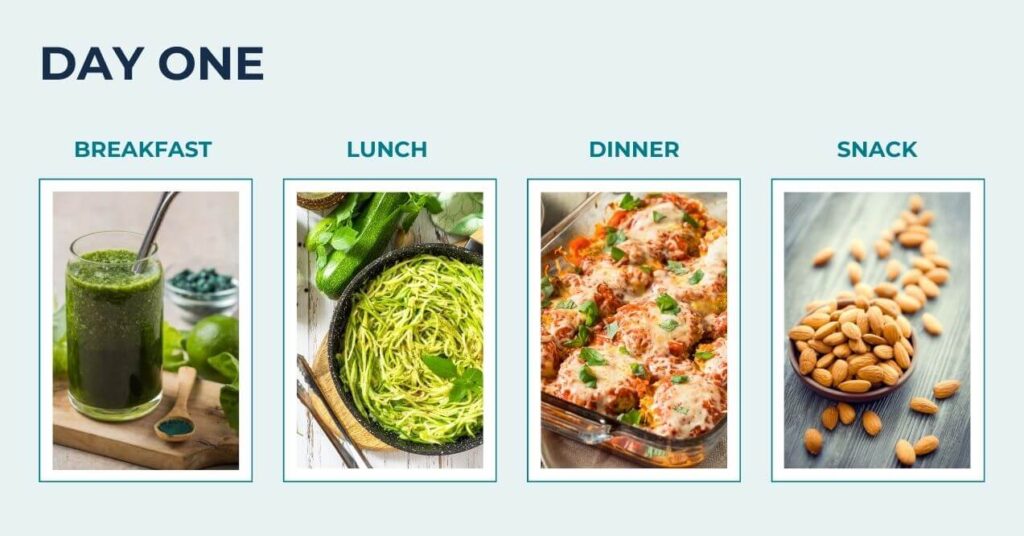
Breakfast: Avocado and Spinach Smoothie
- Blend avocado, spinach, unsweetened almond milk, chia seeds, and a scoop of protein powder for a creamy, nutrient-packed start to your day.
Lunch: Zucchini Noodles with Pesto
- Toss zucchini noodles with homemade basil pesto, cherry tomatoes, and pine nuts for a refreshing, low-carb meal.
Dinner: Eggplant Parmesan
- Baked eggplant slices topped with marinara sauce and mozzarella cheese, served with a side of sautéed spinach.
Snacks:
- Handful of almonds
- Celery sticks with almond butter
Day Two
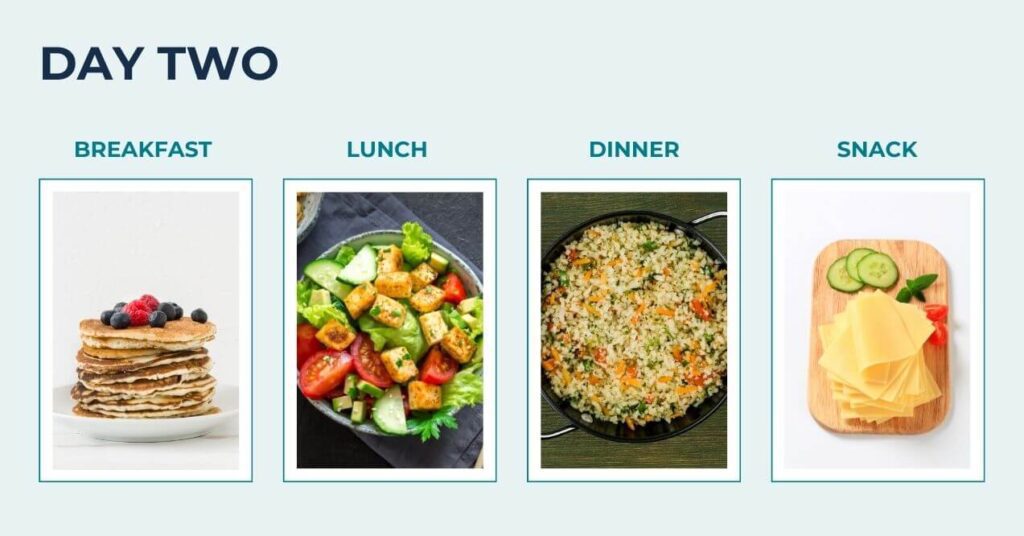
Breakfast: Keto Coconut Flour Pancakes
- Whip up pancakes with coconut flour, eggs, and almond milk, topped with a dollop of Greek yogurt and a few berries.
Lunch: Greek Salad with Tofu
- A vibrant salad with mixed greens, cucumber, olives, feta cheese, and marinated tofu cubes, drizzled with olive oil and lemon juice.
Dinner: Cauliflower Fried Rice
- Stir-fry riced cauliflower with mixed vegetables, tofu, and tamari sauce for a satisfying keto Thai food experience.
Snacks:
- Cheese slices with cucumber rounds
- A small serving of mixed berries
Day Three
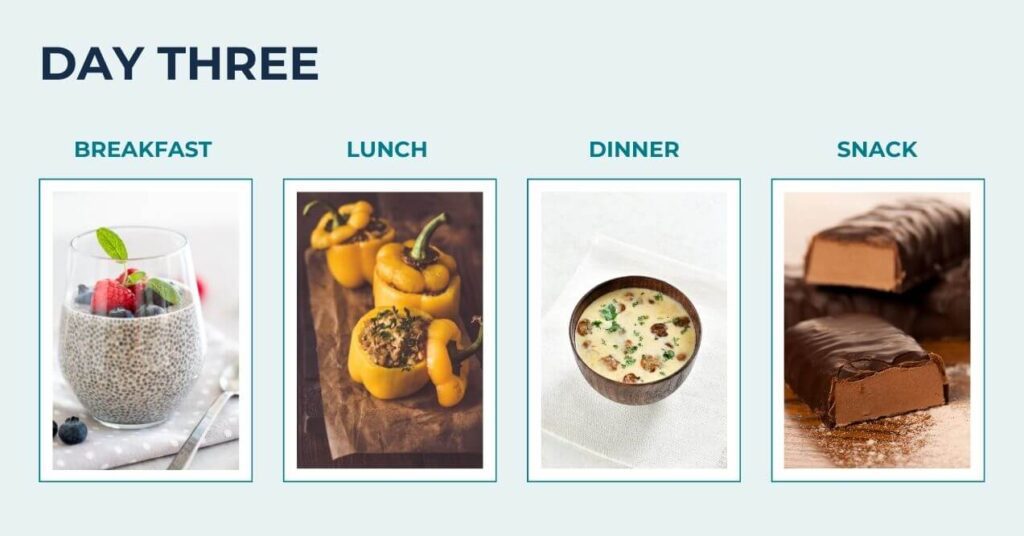
Breakfast: Chia Seed Pudding
- Mix chia seeds with coconut milk and let sit overnight. Top with a few nuts and seeds in the morning.
Lunch: Stuffed Bell Peppers
- Bell peppers filled with a mix of quinoa, black beans, and spices, topped with melted cheese.
Dinner: Creamy Mushroom Soup
- A rich soup made with mushrooms, heavy cream, and vegetable broth, served with a side of grilled asparagus.
Snacks:
- Keto-friendly protein bar
- Radishes with cream cheese
Day Four
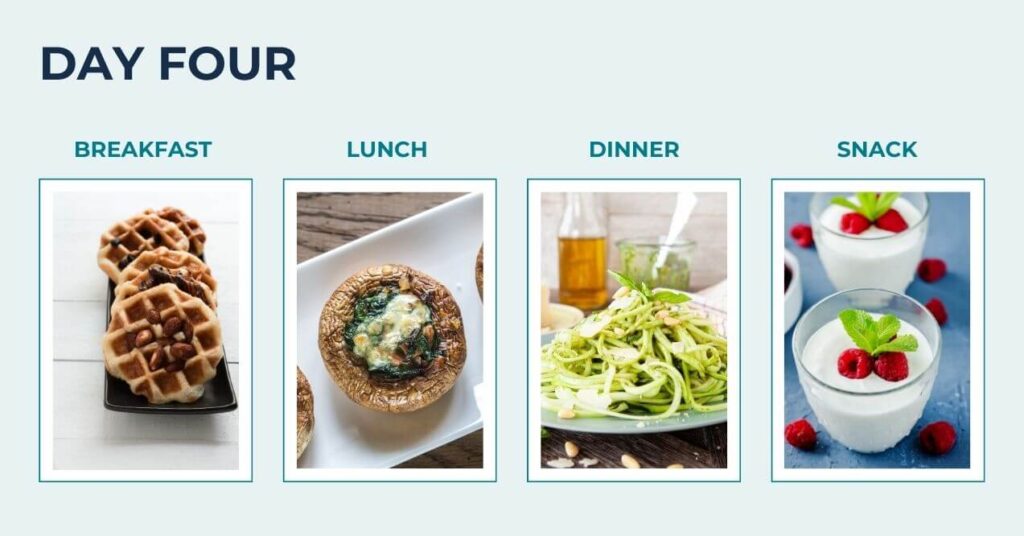
Breakfast: Almond Flour Waffles
- Crisp waffles made with almond flour, eggs, and coconut oil, served with a sugar-free syrup.
Lunch: Spinach and Feta Stuffed Portobellos
- Large portobello mushrooms stuffed with spinach, feta cheese, and herbs, baked to perfection.
Dinner: Zoodles with Alfredo Sauce
- Zucchini noodles topped with a creamy Alfredo sauce made from heavy cream, butter, and Parmesan cheese.
Snacks:
- Guacamole with cucumber slices
- Coconut yogurt with a few raspberries
Day Five
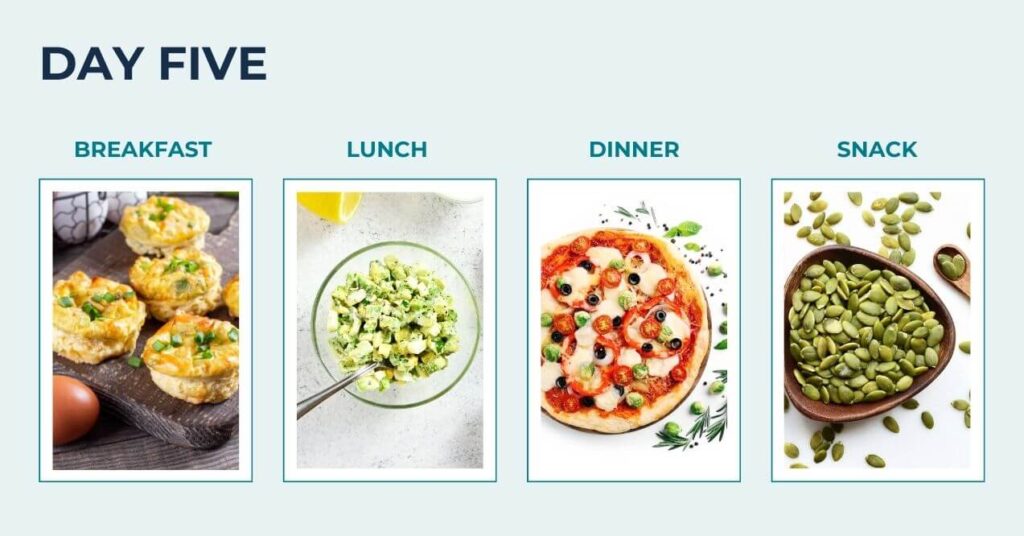
Breakfast: Keto Egg Muffins
- Egg muffins loaded with spinach, bell peppers, and cheese, perfect for meal prep and a quick breakfast.
Lunch: Avocado and Egg Salad
- A creamy salad made with avocado, hard-boiled eggs, celery, and a keto-friendly mayo.
Dinner: Gluten-Free Keto Pizza
Enjoy a delicious homemade pizza with a cauliflower crust topped with cheese, tomatoes, and olives. For more on this, check out our other blog post – is gluten-free pizza keto-friendly?
Snacks:
- Pumpkin seeds
- Cherry tomatoes with mozzarella balls
Day Six
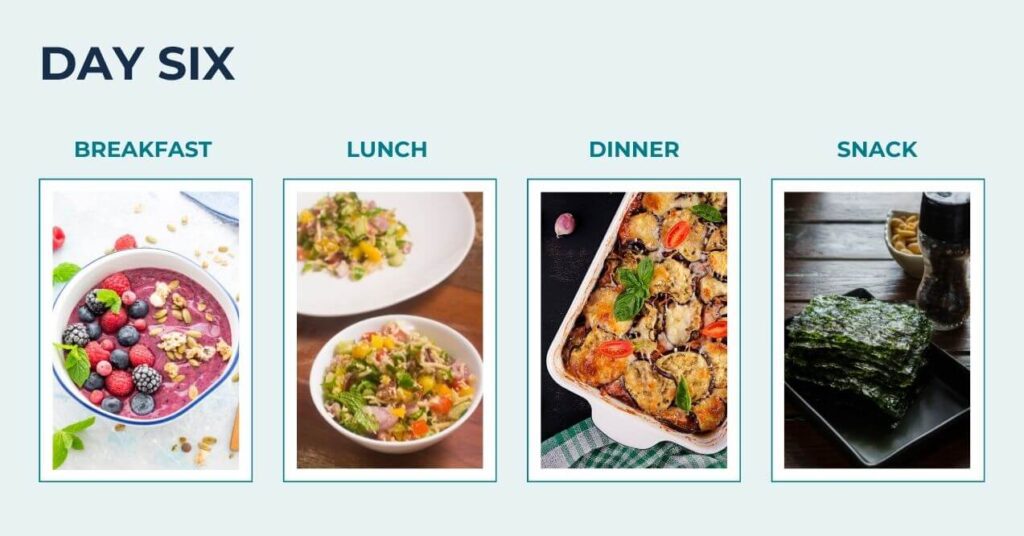
Breakfast: Berry Smoothie Bowl
- Blend mixed berries, Greek yogurt, and a bit of almond milk. Top with nuts and seeds for crunch.
Lunch: Cauliflower Tabbouleh
- A fresh salad made with riced cauliflower, parsley, tomatoes, cucumbers, and a lemon vinaigrette.
Dinner: Eggplant Lasagna
- Layers of eggplant slices, ricotta cheese, spinach, and marinara sauce, baked until bubbly.
Snacks:
- Roasted seaweed snacks
- A few squares of dark chocolate
Day Seven
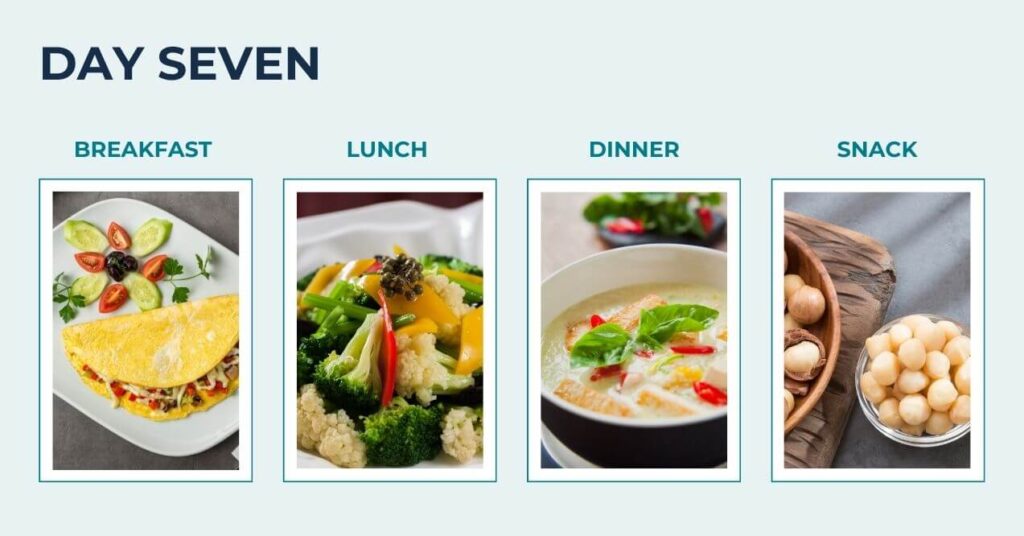
Breakfast: Veggie Keto Omelet
- An omelet packed with spinach, mushrooms, bell peppers, and cheese.
Lunch: Roasted Vegetable Salad
- A hearty salad with roasted broccoli, cauliflower, Brussels sprouts, and a tahini dressing.
Dinner: Keto Thai Coconut Curry
- A flavorful curry made with coconut milk, mixed vegetables, and tofu, seasoned with curry paste. Explore more keto Thai food recipes for variety.
Snacks:
- Macadamia nuts
- Sliced bell peppers with hummus
Is It Hard to Do Keto Diet for Vegetarians?
Transitioning to a vegetarian keto meal plan can be challenging due to its restrictive nature, requiring thoughtful planning to meet nutritional needs without meat. The limitations include finding suitable protein sources, ensuring adequate fat intake, and avoiding hidden carbs in plant-based foods. Despite these challenges, many find success by incorporating diverse ingredients like tofu, tempeh, avocados, and nuts. However, maintaining ketosis can be tough, especially during the initial phase.
To ease this transition, consider supplements for weight loss like the PureHealth Research Keto Formula, endorsed by Dr. Holly Lucille, ND, RN. Together with a ketogenic diet, the premium ketones in this product accelerate the body’s shift into ketosis, reducing the severity and duration of “keto flu” symptoms.
It raises energy, curbs cravings, and supports sustained ketosis, making it easier to stick to your vegetarian keto meal plan. By adding this PureHealth Research supplement to your routine, you may enhance your dietary efforts and achieve your health goals more effectively.
How to Start My 7 Day Vegetarian Keto Meal Plan?
Starting a 7-day vegetarian keto meal plan can seem daunting, but with the right approach, you can set yourself up for success. Here are some tips and tricks to help you begin and stick to your meal plan:
- Track Your Food Intake. Use an app, spreadsheet, or notebook to record everything you eat. This helps you understand your current eating habits and identify areas for improvement.
- Gradually Reduce Carbohydrate Intake. Focus on lowering carbs progressively rather than cutting them out all at once. Replace high-carb foods with healthier options like vegetables and low-carb grains.
- Familiarize Yourself with Nutrition Labels. Learn to read nutrition labels to make informed food choices. Look for hidden carbs and sugar in packaged foods.
- Get Creative with Meal Planning and Preparation. Plan your meals ahead of time to avoid last-minute unhealthy choices. Experiment with different recipes to keep your meals varied and exciting.
- Stock Up on Keto-Friendly Foods. Ensure your pantry and fridge are filled with keto-friendly staples like avocados, nuts, seeds, and low-carb vegetables. Having these foods on hand makes it easier to stick to your meal plan.
- Stay Hydrated. Drink plenty of water throughout the day. Consider adding electrolyte supplements to avoid imbalances.
The Bottom Line
Ultimately, a 7-day vegetarian keto meal plan offers a gateway to a healthier you. By harmonizing intermittent fasting, keto principles, and a plant-based focus, you set the stage for optimal metabolic function, enhanced mental clarity, and sustainable weight management. While the journey might require some adaptation, the rewards are manifold.
Remember, with a well-structured plan, mindful choices, and the right support (such as PureHealth Research’s Keto Formula), you can unlock the full potential of this dietary approach and achieve your health goals. So, are you ready to take the first step?
Yes, you can go on a keto diet if you are vegetarian. It requires careful planning to ensure you get enough protein and healthy fats from plant-based sources like nuts, seeds, avocados, and dairy while keeping your carbohydrate intake low.
Yes, you can have Greek yogurt on keto, but choose full-fat, unsweetened varieties. Greek yogurt is low in carbs and high in protein, making it a good option, but always check the label to ensure it fits within your daily carb limit.
Weight management on keto varies by individual, but some people report to lose 5-10 pounds in the first two weeks. This includes water weight reduction due to reduced glycogen stores.
Popular Articles
Advertisement. This site offers health, wellness, fitness and nutritional information and is designed for educational purposes only. You should not rely on this information as a substitute for, nor does it replace, professional medical advice, diagnosis, or treatment. If you have any concerns or questions about your health, you should always consult with a physician or other health-care professional. Do not disregard, avoid or delay obtaining medical or health related advice from your health-care professional because of something you may have read on this site. The use of any information provided on this site is solely at your own risk.
